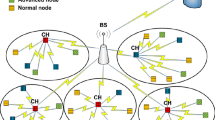Abstract
Network lifetime has become a new challenge for wireless heterogeneous network because of battery base nodes or limited power nodes. To increase the network lifetime, we have to plan the new approach with an alternate solution of distribution of the load on multiple nodes in order to maintain guaranteed services. In our proposed work, we have planned to distribute the load with optimized node swapping scheme, based on energy level and distance. The node swapping will be carried out only with the optimized register neighbor nodes with their energy level and distance between them. The resulting analysis shows that the proposed work enhances the overall lifetime of the network and reduces the packet loss, which leads to an increase in the efficiency with minimum node swapping latency.
Access this chapter
Tax calculation will be finalised at checkout
Purchases are for personal use only
Similar content being viewed by others
References
S. Jain, R. Shah, W. Brunette, S. Roy, Exploiting mobility for energy efficient data collection in wireless sensor networks. MONET 11(3), 327–339 (2006)
C.-C. Ooi, C. Schindelhauer, Minimal energy path planning for wireless robots, in ROBOCOMM, p. 2 (2007)
J. Luo, J.-P. Hubaux, Joint mobility and routing for lifetime elongation in wireless sensor networks, in INFOCOM, pp. 1735–1746 (2005)
A. Kansal, D.D. Jea, D. Estrin, M.B. Srivastava, Controllably mobile infrastructure for low energy embedded networks. IEEE Trans. Mob. Comput. 5(8), 958–973 (2006)
H. Xu, L. Huang, Y. Zhang, H. Huang, S. Jiang, G. Liu, Energy-efficient cooperative data aggregation for wireless sensor networks. J. Parallel Distrib. Comput. 70(9), 953–961 (2010)
S. Jain, R. Shah, W. Brunette, G. Borriello, S. Roy, Exploiting mobility for energy efficient data collection in wireless sensornetworks. Mobile Netw. Appl. 11(3), 327–339 (2006)
C. Tang, P.K. McKinley, Energy optimization underinformed mobility. IEEE Trans. Parallel Distrib. Syst. 17(9), 947–962 (2006)
W. Ren, Q. Zhao, A. Swami, Power control in cognitive radio networks: How to cross a multilane highway. IEEE J. Sel. Areas Commun. 27(7), 1283–1296 (2009)
V. Osa, C. Herranz, J.F. Monserrat, X. Gelabert, Implementing opportunistic spectrum access in LTE-advanced. EURASIP J. Wireless Commun. Netw. 2012, 99 (2012)
C.-E. Weng, J.-M. Zhang, H.-L. Hung, An efficient power control scheme and joint adaptive modulation for wireless sensor networks. Comput. Electr. Eng. 40, 641–650 (2014)
Q. Song, Z. Ning, Y. Huang, L. Guo, X. Lu, Joint power control and spectrum access in cognitive radio networks. J. Netw. Comput. Appl. 41, 379–388 (2014)
F. Baccelli, N. Bambos, N. Gast, Distributed delay-power control algorithms for bandwidth sharing in wireless networks. IEEE/ACM Trans. Netw. 19(5), 1458–1471 (2011)
D.W.K. Ng, E.S. Lo, R. Schober, Energy-efficient resource allocation in multi-cell OFDMA Systems with limited Backhaul capacity. IEEE Trans. Wireless Commun. 11(10) (2012)
J. Liu, N. Kato, J. Ma, N. Kadowaki, Device-to-Device Communication in LTE-Advanced Networks: A Survey (IEEE, USA, 2013), pp. 1553-877X (c)
Author information
Authors and Affiliations
Corresponding author
Editor information
Editors and Affiliations
Rights and permissions
Copyright information
© 2019 Springer Nature Singapore Pte Ltd.
About this paper
Cite this paper
Padaganur, S.K., Mallapur, J.D. (2019). Optimized Node Swapping for Efficient Energy Usage in Heterogeneous Network. In: Wang, J., Reddy, G., Prasad, V., Reddy, V. (eds) Soft Computing and Signal Processing . Advances in Intelligent Systems and Computing, vol 900. Springer, Singapore. https://doi.org/10.1007/978-981-13-3600-3_66
Download citation
DOI: https://doi.org/10.1007/978-981-13-3600-3_66
Published:
Publisher Name: Springer, Singapore
Print ISBN: 978-981-13-3599-0
Online ISBN: 978-981-13-3600-3
eBook Packages: Intelligent Technologies and RoboticsIntelligent Technologies and Robotics (R0)




